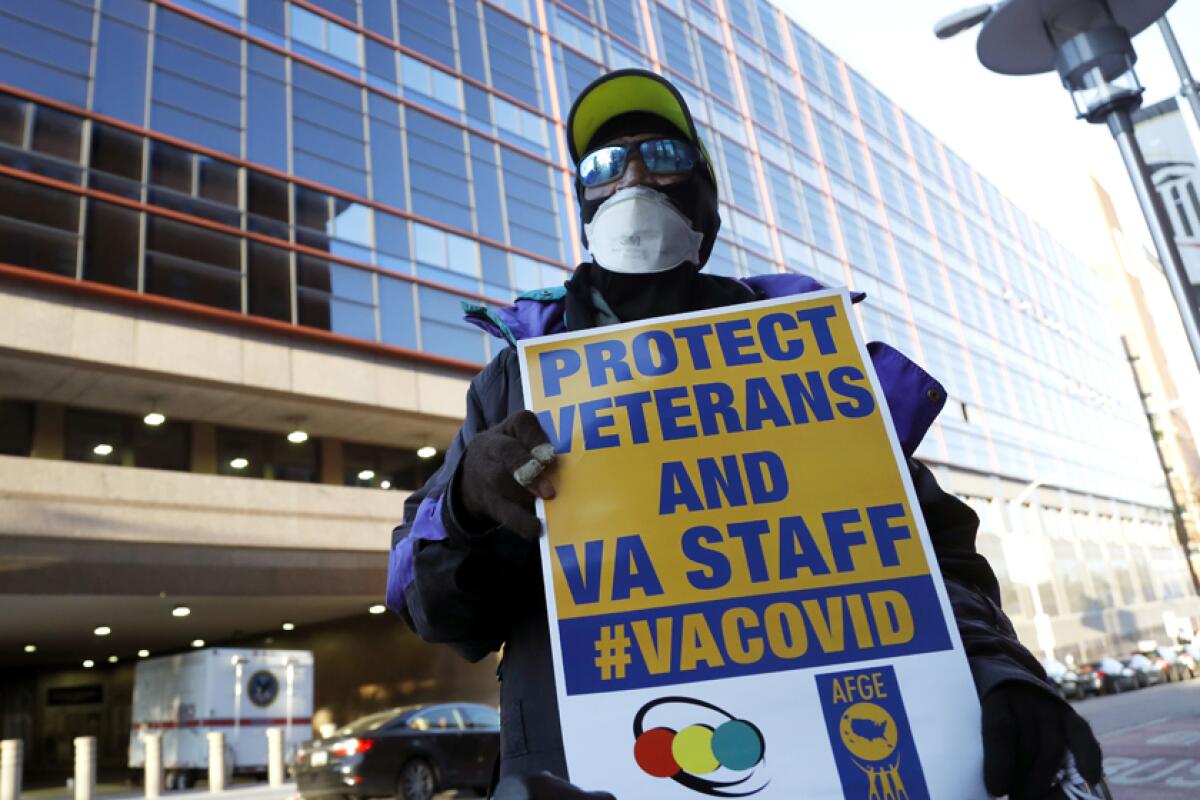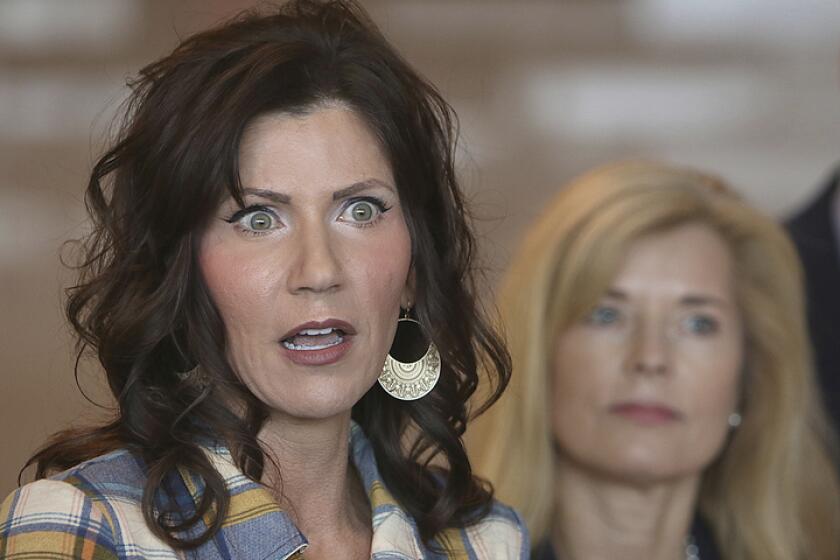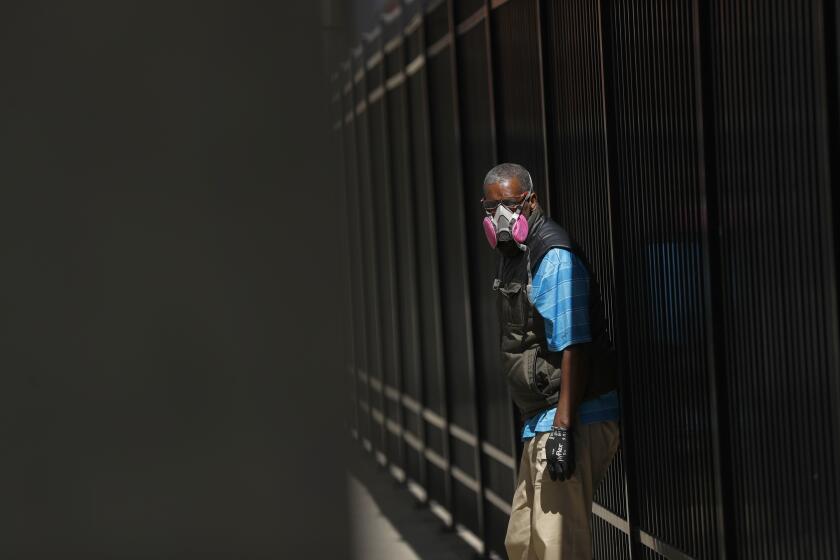VA medical facilities struggle to cope with the coronavirus

- Share via
BOSTON — As she treated patient after patient infected with the coronavirus at a Veterans Affairs medical center in New York City, Heather Espinal saw stark warning signs.
So many nurses had called in sick, she said, that the Bronx facility was woefully understaffed. It lacked specially equipped rooms for infected patients, she said, and didn’t have enough masks, gloves and other protective gear to guard against the spread of the contagious disease.
Espinal, 34, says she and her colleagues were told to do the best they could, using a single N95 face mask for an entire shift rather than getting a new one for each patient. In early April, she tested positive for COVID-19.
“I definitely believe it was related to me being at work,” said Espinal, who was out sick for two weeks.
Espinal is one of 1,900 VA healthcare workers who have become sick with the coronavirus, according to agency documents obtained by the Associated Press. Twenty have died. Another 3,600 of the 300,000-plus VA healthcare employees are quarantined and unable to work because they have been exposed to the virus, according to VA figures.
Republican governors of eight states have not issued stay-at-home orders, even as coronavirus outbreaks spread at factories, long-term care facilities and prisons.
As the coronavirus spreads across the U.S., VA healthcare facilities are struggling with shortages of workers and the equipment necessary to protect employees from the virus, according to VA staff and internal documents obtained by the Associated Press.
“We thought we were doing everything right, even with reusing these N95 respirators. But we still ended up getting sick,” Espinal said.
More than 5,700 veterans treated by the VA have been infected by the coronavirus, and nearly 380 have died.
The Labor Department is investigating, and several Democrats in Congress plan to send a letter Thursday calling on President Trump to take emergency action to get supplies for VA health facilities.
The VA, responsible for the healthcare of 9 million military veterans, denied it was short of supplies and stressed that it follows federal health guidelines when rationing personal protective equipment like masks and gloves.
“VA’s PPE conservation posture is precisely why the department has not encountered any PPE shortages that have negatively impacted patient care or employee safety,” said spokeswoman Christina Mandreucci.
She said the VA has moved aggressively in recent weeks to add staff, hiring 3,183 people, including 981 nurses, from March 29 to April 11.
But interviews with VA employees at facilities around the country, VA documents, and a March report by the agency’s inspector general tell another story.
What do scientists wish they knew about the coronavirus? Which treatments actually work, what antibodies are good for, and which public health measures help.
The facilities were short of staff and equipment like masks, eye shields, hand sanitizer and gowns. Some workers were forced to reuse masks for days or weeks, according to interviews with VA nurses.
The inspector general’s staff visited over 230 facilities in March. It found that nearly a third of the medical centers could improve their processing for screening visitors. More than half of the medical centers reported shortages of supplies and equipment including respirator masks, and 10 reported shortages of staffing mostly for nurses in intensive care units.
“There has been a failure of leadership at VA, and veterans, VA employees and the public are suffering as a result,” said Paul Rieckhoff, founder of the Iraq and Afghanistan Veterans of America and host of the podcast “Angry Americans.”
Susan Gordon, a senior policy analyst at the nonpartisan Veterans Healthcare Policy Institute, said VA preparations were hampered by inadequate funding and staff, leaving it with nearly 50,000 job openings.
“In VA facilities all over the country, they are doing a really incredible job trying to respond to the crisis in a situation where they have been deliberately crippled by the Trump administration,” Gordon said.
As the nation’s largest healthcare system, the VA typically enjoyed preferred status in orders for medical supplies from vendors.
But as the outbreak escalated in the U.S., demand for crucial medical equipment spurred frantic competition for supplies, including from state governments and the National Stockpile. The Federal Emergency Management Agency began buying supplies directly from manufacturers, and the VA began submitting its orders to FEMA alongside others.
You’ve heard the term “herd immunity.” Here’s what it means and why it’s important as we think about returning to something like a normal life.
Not long after, according to people familiar with VA’s weekly briefings to Congress, the supply shortages got worse as medical workers burned through 250,000 masks a day.
On April 7, the VA issued guidelines asking workers to ration masks in response to what the department described as “shortages.” Citing Centers for Disease Control and Prevention guidelines, the VA said employees in direct contact with COVID-19 patients should use N95 masks as protection but may need to reuse them. VA staff working with high-risk elderly or vulnerable patients, such as those in nursing homes or spinal cord facilities, would only get one face mask per work week.
After criticism from staff, and a small increase in supplies, the VA on April 16 said employees working with high-risk elderly or vulnerable veterans could now have one face mask per day.
A complaint filed by the American Federation of Government Employees alleged that VA workers who came in contact with someone suspected of contracting the virus were told on orders of VA Secretary Robert Wilkie that they still had to report to work — ignoring a 14-day quarantine period.
The staff and equipment shortages are creating chaos at the VA medical center in Brooklyn, according to Maria Lobifaro, an intensive care nurse. She says she’s forced to juggle five critical ICU patients on ventilators rather than the usual two critical patients.
“It’s to the point where ... my hands are trembling because of what I’m going to walk into,” she said.
A group of Senate Democrats blames Trump for a “broken procurement and distribution system developed by this administration.” They’re urging him to invoke the Defense Production Act.
“Those who care for veterans should not be afraid to wake up every morning, go to work and help save veterans’ lives,” says a letter being sent to the White House by Sen. Jon Tester of Montana, the top Democrat on the Senate Veterans Affairs Committee. More than a dozen senators joined him.
More to Read
Sign up for Essential California
The most important California stories and recommendations in your inbox every morning.
You may occasionally receive promotional content from the Los Angeles Times.
















